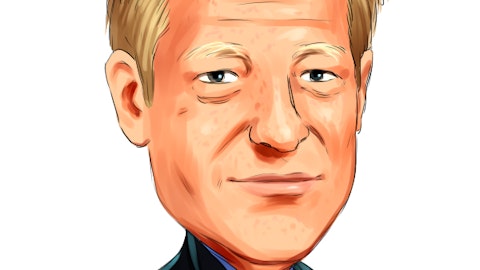Damian Kozlowski: Yes. So it would basically wipe out – it would lock in the profitability up and down, by the way. So that’s why we’re wait and see. So we could get the 6% on the Fed funds. But that – what happened – obviously, what happened yesterday on continuing claims, durable good orders on GDP were all very big surprises that show that the economy is much more resilient. If you just look at our GDV growth, there is a lot of resiliency in the economy. And we still have an 8% – we’re over 8% on the deficit, too, on fiscal spending. So there is a lot of stimulus still in the economy also. So we’re going to just keep an eye on it. And we’re in such a good position that we don’t – it’s kind of where we were with the bond. We didn’t buy a bond for 40 years because we’re in a good position on liquidity and deposits, etcetera. So we’re doing the same thing in this case.
Frank Schiraldi: Okay. Alright, great. Thanks for all the color.
Operator: Your next question comes from David Feaster at Raymond James. Please go ahead.
David Feaster: Hi, good morning, everybody.
Damian Kozlowski: Good morning, David.
David Feaster: Maybe just following up on one of the questions or one of the things you talked about prepared remarks, you talked about expanding relationships. Obviously, we – you extended and expanded the Chime relationship, and you talked about going deeper with the existing partners. Could you expound on that? Where are you seeing opportunity for expansion there? And what other initiatives you have in place to continue to deepen relationships?
Damian Kozlowski: So generally, I think people have accepted that they got to be broader fin-tech, especially neobanks, but also other verticals outside of government. You have to be – you have to expand your product set for profitability. So we’re in discussions across all of our major clients that they want to add services. They want to add product capabilities. So this is something that’s happening across the entire franchise. But if you take a large neobank, for example, they are wanting to not just be a debit provider, but they want to build a portfolio of products around their key clients and expand it into credit. So that’s exactly what we’re doing. So where we can support them in doing that, we help them, in many cases, innovate, but also they may be with another provider today that they want to put into our ecosystem that’s happening, but also in the – obviously, in the credit area, where most of the debit providers want to build and start to build both sides of the balance sheet business in order to increase their profitability.
So we’re – with our partners, they are very deep relationships over very long-terms. As I just said, we just expanded our relationship with Chime in those areas, and we will continue to do that. I think that’s where the – there is going to be a lot – in fact, we’re not dealing with very many start-ups, obviously, there is going to be a lot less startups because of what’s happened in fin-tech. And the dominant players now who are out there, which many of our clients are looking to significantly increase their profitability and deepen their relationships with their clients, and we’re lockstep with them.
David Feaster: Okay. That’s helpful. Maybe just touching on the pipeline of partners that you have. It sounds like you’re still continuing to onboard folks at a pretty rapid pace. I’m just curious, did has the pipeline, I guess, with the market dynamics, has the pipeline – have you seen continued increases in the pipeline just as maybe this pushes more partners to you? And then maybe as you go through these negotiations, I guess, how is your pricing power? Are you seeing the competitive landscape heat up and maybe you’re having to conceive more? Or just given your dominance in the space and your reputation? Or are you able to kind of defend that in these negotiations?



